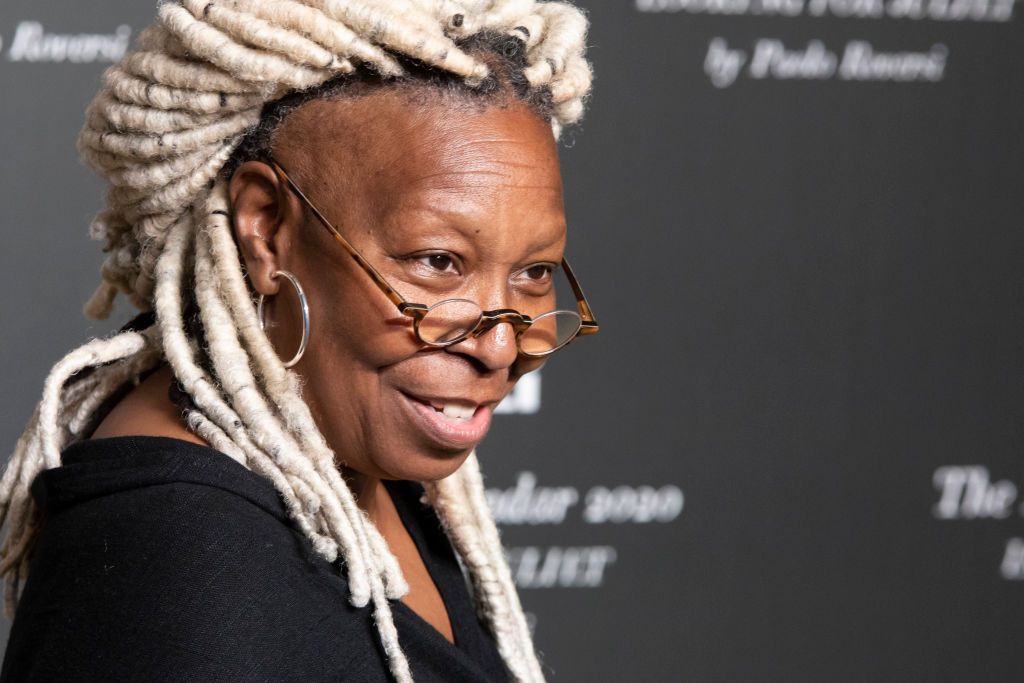
Source: Mondadori Portfolio / Getty
Whoopi Goldberg has had a dreamlike career in the entertainment industry. She can play any role. Tell a great joke. And host a show with charisma and flair. She’s done quite a bit and she has the awards to prove it. Whoopi is the only Black woman and one of five Black people to have won an Emmy, Oscar, Grammy and Tony.
And while you would think one of our own achieving this type of success in the most competitive industries, that was not the case for Goldberg. Some of the harshest criticism she received throughout her career has stemmed from the Black community. Recently, in preparation for being honored during Essence’s annual Black Women in Hollywood event, Goldberg spoke to ESSENCE about those moments and why she still remembers them.
See what she had to say below.
“Listen, I caught a lot of shit from Black people [over the years]. Apparently I wasn’t Black enough, but people forget if they saw me running down the street and it’s the Klan, they’re going to chase me. That’s how I measure it, is the Klan going to chase you if you run? Yes. They’re going to chase me. That means I’m Black enough.”
Whoopi attributed the perception to being ushered into the industry by a few white folks. Then she shared that marrying and dating white men didn’t help matters.
Whoopi’s breakout role in The Color Purple was met with criticism by more than a few Black people, including members of the NAACP. It would have been hard for Whoopi not to take notice. She felt perhaps folks took issue with the fact that Steven Spielberg was tasked with telling such an intimate Black story. But Whoopi shared that no one else was interested.
“You don’t see a lot of Black people in movies, in ensemble films, and here’s a great ensemble film made by a guy who probably would not have made it if someone else had stepped up, but nobody else did. And so he’s getting sh*t for doing it, and then we make this really good film, and then everybody’s pissed. It’s like, you did read the book, didn’t you? What did you think we were doing?”
First, people were upset that Spielberg helmed the film. Then they took issue with the fact that Black men were not painted in a positive light. People even argued that the story didn’t represent the Black experience.
Today, Goldberg responds to that criticism saying, “Well, it’s somebody’s Black experience because she wrote a book called The Color Purple. We got 11 nominations and no win because I think people said, ‘Let’s just acknowledge that they did it and keep it moving.’”
More than just criticism of her and the film, Whoopi felt like all the backlash directed toward The Color Purple slowed progress in terms of other Black folk starring in frilm.
“All of that, I feel – I said that then and I say it now— put the kibosh on people putting a lot of Black ensembles together for a full-length film because nobody wanted to be told they were doing it wrong.”
It wasn’t just folks outside of the industry who didn’t seem to “get” or understand Whoopi. She shared that in terms of other Black women in Hollywood, she wasn’t often embraced with warm fuzzies either.
“Alfre Woodard, and, I have to say, Debbie Allen too, those were the two women who kept me bolstered.”
Whoopi thinks her type of Black is just a little too different for most folks to understand and so it’s easier for them to keep their distance.
“I looked too odd, and I knew lots of white people, and apparently you’re not supposed to. And, my God, I might have married a couple of them. It’s only in the last 10 years have people been like, ‘No, it’s really good, man, you’re all right.’ Like, thank you?”
Whoopi doesn’t harbor any resentment but she “doesn’t mind saying I saw it. I see it, I’m aware of it. I’m glad you’ve evolved. But just don’t do it to somebody else because it’s kind of dumb. And that’s the problem with not having that connection with other people because the thing that you know as an artist is that we’re all trying to do the same thing, we’re trying to make our art better, and so why not support folks?”
In some ways though, Whoopi was prepared for this—the consequences of being her authentic self by her mother, Emma Johnson, who worked as a nurse and a teacher.
“My mother was really clear in who I could be if I wanted to be, and the costs of that. The costs of being an individual, the cost of looking different than other people, the cost of sounding different in other people’s minds, the cost of people’s perceptions of what being Black is and not letting them limit who you are because they don’t see the big picture.”
You can read Whoopi’s full interview over at ESSENCE.com.


